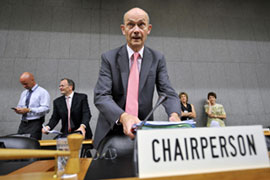Timeline: Disagreement at the WTO
Nearly seven years of negotiations have failed to result in an agreement.

 |
| The Doha round of negotitations has been hit by numerous missed deadlines [AFP] |
Talks to rescue a new world trade deal collapsed on Tuesday after ministers from some 35 countries failed to overcome their divisions during nine days of talks.
Delegates have been trying find common ground now on global free trade for almost seven years since a World Trade Organisation meeting in Qatar
November 2001 – WTO members meeting in Qatar agree to launch the Doha round of multilateral talks with an emphasis on development and opening markets in agriculture, manufacturing and services. Countries set a goal to finish the round by January 1, 2005.
January 2002 – Talks get off to promising start with quick selection of chairmen to head negotiating groups in Geneva, the headquarters of the World Trade Organisation.
March 2003 – Countries miss deadline for deciding on formula to cut agricultural tariffs, domestic support and export subsidies. Similar deadlines are missed in the manufacturing talks, and services negotiations begin to fall behind.
September 2003 – Developing countries heavil criticise joint US-EU agricultural proposal at a ministerial meeting in Cancun, Mexico, and form the G20 negotiating block led by India and Brazil. Luis Ernesto Derbez, the conference chairman, ends the acrimonious conference, saying it was impossible in the time left to bridge differences.
January 2004 – Robert Zoellick, the US trade representative, encourages countries to pick up the pieces from Cancun.
July 2004 – Negotiators in Geneva agree on a framework for finishing the Doha round, but put off the toughest decisions.
January 1, 2005 – WTO members miss deadline for finishing round.
December 2005 – The WTO holds its fifth ministerial meeting in Hong Kong. Countries agree to eliminate agricultural exportsubsidies by 2013, but again fail to agree on formula for cutting domestic farm subsidies and tariffs.
April 2006 – Negotiators miss new agriculture and manufacturing deadlines set in Hong Kong.
July 2006 – Pascal Lamy, the WTO director-general, suspends the negotiations after the G6 – comprising of the United States, European Union, Brazil, India, Japan and Australia – fails to break the impasse on agriculture.
 |
| Lamy has repeatedly warned against failure in the Doha round [AFP] |
February 2007 – After months of bilateral and small group consultations, Lamy declares multilateral negotiations in Geneva to be back in full swing.
May 2007 – Lamy warns a failure of the Doha round would mean “breaking the commitment for a more development-friendly world trading system”.
June 2007 – Susan Schwab, the US trade representative, Peter Mandelson, EU trade commissioner, Celso Amorim, Brazilian foreign minister, and Kamal Nath, India’s commerce minister, meet in Potsdam to try and break the impasse.
The talks collapse, with India and Brazil complaining that the United States and the European Union were demanding too much access to new manufacturing markets in exchange for cutting farm subsidies and tariffs.
July 2007 – Don Stephenson, Canadian ambassador to the WTO, and Crawford Falconer, New Zealand ambassador to the WTO, who chair negotiating groups on industrial and agricultural goods, release draft proposals meant to push members toward consensus.
September 2007 – WTO member governments start to attempt to work through differences over technical issues outlined in the text.
November 2007 – Guillermo Vales Galmes, Uruguay’s WTO ambassador, circulates a negotiating text on rules which the United States denounces as very disappointing.
January 2008 – High-level officials including Amorim and Mandelson say they want a ministerial meeting to advance the Doha process in the coming months.
February 2008 – Falconer and Stephenson circulate revised versions of the agriculture and industrial goods papers.
June 25, 2008 – Lamy calls for selected ministers to meet in Geneva to broker an outline deal in agriculture and industrial goods, with the aim of completing the rest of the negotiations later in the year.
June 27, 2008 – WTO member governments endorse the meeting of ministers, despite reservations in many quarters about the large number of issues yet to be resolved before ministers can make high-level decisions on subsidies and tariffs.
July 2008 – Falconer and Stephenson release new updates of the negotiating texts, which form the basis of what will be presented to ministers in high-level talks starting July 21.
July 29, 2008 – WTO talks collapse as the US and India fail to find a compromise on measures intended to help poor countries protect their farmers against import surges.